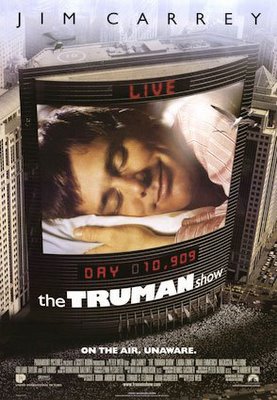DonBoy
Let me say publicly that DonBoy’s answer exudes a combination of intuitive genius and confidence that make me think DonBoy is going to do big things in his life. -- Steven D. Levitt (Freakonomics blog)
Sunday, March 05, 2006
From Tell Me How You Love the Picture, a book of Hollywood reminiscences by longtime producer Ed Feldman:
The first test screenings of [The Truman Show] didn't go very well. Not many people know this, but the initial cut of the movie started wth the introduction to the Truman TV show: "Coming to you now from Seahaven Island...It's The Truman Show!" The audience knew immediately that they were watching a movie about a man whose life is a TV show. And it just didn't work. The audience was in on too much, too early. I was one of a chorus of people who saw an easy fix to this problem.Hm. On the one hand, I agree that the film must play differently if the audience is shown the reality up front. On the other hand, here's one of the one-sheets (lobby ads) used at its release:
[Director] Peter [Weir] simply moved the revelation of the TV show to about the sixty-minute mark, with miraculous results. The audience was now merely watching this man's rather humdrum life, knowing something is out of kilter but not being able to pinpoint the reason. As the film reaches a dramatic crescendo, all is revealed. The test scores went up.
But Truman never tested all that well for reasons unknown to me. This was somewhat surprising, given that it became a smash hit.

"On The Air, Unaware". And that's just the one-sheet. See a trailer here, and how much documentation do you need anyway -- you and I both remember that everybody went into the theatre knowing exactly what the deal was. (Test audiences, of course, don't get to see the marketing; they're probably the only people in America who don't.)
But let's go back to the first hand -- Feldman is right that it's a different experience if the knowledge is given inside the movie instead of outside it. Here's another example: Terminator 2 is clearly made as if it's a huge plot twist that this time, Arnold, who was the evil unstoppable killing machine in T1, is a good unstoppable killing machine. T2 begins with the same appearences, through the time portal, of Arnold and a normal-looking guy. It's not until both of them are at the mental institution that we learn that the Arnie-bot is protecting Sarah Connor, not attacking her.
And yet, the marketing of the movie told everyone up front that Arnold was a good Terminator this time -- although in this case, it wasn't in the posters or the trailers, but it was bandied about in other publicity. And I guess you can't blame them, and it obviously didn't hurt the success of the film; but it's completely at odds with the movie seems to intend.
So how do we watch a movie and appreciate the "surprise" under those circumstances? Simple: we just pretend not to know. Most viewers are used to doing this; it's what we're doing when we rewatch a movie and perceive a surprise in the story, but do not experience surprise.
But hold on again; does that mean that there's no such thing as "spoiling" a movie? Oh, hell no. I demand to experience all the movies with big plot twists as they're intended to be seen. I find that I can only really do the "pretend" thing -- or do it better -- if I saw the movie the first time unspoiled. In that case, I can summon the self-as-I-was-before-I-knew and, in a way, relive the unspoiled state. But if I don't have that past self, I can't do it. That's why having it spoiled is so galling; it screws up every re-viewing as well as the original viewing.
So what's the difference between the case where I need the unspoiled-me, and the case where I don't? I don't know. It might just be how I think I'm "supposed" to watch the movie - that is, the cases of Truman and T2 above are cases where I've been told by the creators that it's OK to know certain plot aspects beforehand -- even though they've told me outside the fiction. And in some cases to not-know is explicitly against the intent of the creators. That may seem a stretch, but consider the apocryphal stories of younger viewers of Titanic who thought they had the film "spoiled" by someone telling them in advance that the ship sinks. Or for that matter, the entire Star Wars prequel trilogy. Or the Smallville TV series.
So after all that, I guess it comes down to "I like to see movies as the creators intended me to see them". The interesting part is that the creators' intentions are more carefully calibrated than you might think, and sometimes they change during the process of creation.
(But, if you ever get a chance to see the anime series Paranoia Agent, do it the way I did: with absolutely no knowledge of anything about it. Cartoon Network had it on last year and they'll probably run it again.)

